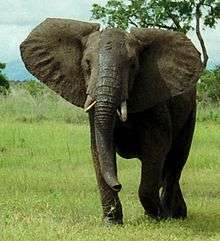Definify.com
Webster 1913 Edition
Elephant
El′e-phant
(ĕl′ē̍-fant)
, Noun.
[OE.
elefaunt
, olifant
, OF. olifant
, F. éléphant
, L. elephantus
, elephas
, -antis
, fr. Gr. ἐλέφας
, ἐλέφαντος
; of unknown origin; perh. fr. Skr. ibha
, with the Semitic article al
, el
, prefixed, or fr. Semitic Aleph hindi
Indian bull; or cf. Goth. ulbandus
camel, AS. olfend
.] 1.
(Zoöl.)
A mammal of the order
Proboscidia
and family Elephantidae
, of which two living species, Elephas maximus
(formerly Elephas Indicus
) and Loxodonta Africana
(formerly E. Africanus
), and several fossil species, are known. They have five toes, a long proboscis or trunk, and two large ivory tusks proceeding from the extremity of the upper jaw, and curving upwards. The molar teeth are large and have transverse folds. Elephants are the largest land animals now existing. The elephant is classed as a pachyderm
. 2.
Ivory; the tusk of the elephant.
[Obs.]
Dryden.
Elephant apple
(Bot.)
, an East Indian fruit with a rough, hard rind, and edible pulp, borne by
– Feronia elephantum
, a large tree related to the orange. Elephant bed
(Geol.)
, at Brighton, England, abounding in fossil remains of elephants.
Mantell.
– Elephant beetle
(Zoöl.)
, any very large beetle of the genus
– Goliathus
(esp. G. giganteus
), of the family Scarabæidæ
. They inhabit West Africa. Elephant fish
(Zoöl.)
, a chimæroid fish (
– Callorhynchus antarcticus
), with a proboscis-like projection of the snout. Elephant paper
, paper of large size, 23 × 28 inches.
– Double elephant paper
, paper measuring 263⁄4 × 40 inches. See Note under
– Paper
. Elephant seal
(Zoöl.)
, an African jumping shrew (
– Macroscelides typicus
), having a long nose like a proboscis. Elephant’s ear
(Bot.)
, a name given to certain species of the genus Begonia, which have immense one-sided leaves.
– Elephant's foot
(Bot.)
(a)
A South African plant (
Testudinaria Elephantipes
), which has a massive rootstock covered with a kind of bark cracked with deep fissures; – called also tortoise plant
. The interior part is barely edible, whence the plant is also called Hottentot's bread
. (b)
A genus (
– Elephantopus
) of coarse, composite weeds. Elephant's tusk
(Zoöl.)
, the tooth shell. See
Dentalium
.Webster 1828 Edition
Elephant
EL'EPHANT
,Noun.
1.
The largest of all quadrupeds, belonging to the order of Bruta. This animal has no foreteeth in either jaw; the canine-teeth are very long; and he has a long proboscis or trunk, by which he conveys food and drink to his mouth. The largest of these animals is about 16 feet long and 14 feet high; but smaller varieties are not more than seven feet high. The eyes are small and the feet short,round,clumsy, and distinguishable only by the toes. The trunk is a cartilaginous and muscular tube, extending from the upper jaw, and is seven or eight feet in length. The general shape of his body resembles that of swine. His skin is rugged, and his hair thin, The two large tusks are of a yellowish color,and extremely hard. The bony substance of these is called ivory. The elephant is 30 years in coming to his full growth, and he lives to 150 or 200 years of age. Elephants are natives of the warm climates of Africa and Asia, where they are employed as beasts of burden. They were formerly used in war.2.
Ivory; the tusk of the elephant.Definition 2026
Elephant
Elephant
German
Noun
Elephant m (genitive Elephanten, plural Elephanten)
- elephant. Obsolete form of Elefant.
- (chess, obsolete) castle, rook
- Das Schach- oder Königs-Spiel, also eingerichtet, daß es theils, Eine Person für sich alleine, theils ein Paar Persnen zugleich, ohne einen Lehrmeister, erlernen können. (without author, year and page numbers, books.google):
- Denn folgen, dem Könige zur Seite, ein Laufer, Springer, und Elephant; wie auch der Königin zur Seite gleichfals ein Laufer, Springer, und Elephant. [...] Ein Elephant schiebt sich grade zu, so weit Er wil, Rechts und Lincks, vorwerts und hinterwerts [...] Er hat die Helfte von den Gängen der Königin. Die Königin [...] geht also, wie ein Elephant, auch wie ein Weisser und Schwartzer Laufer.
- Das Schach- oder Königs-Spiel, also eingerichtet, daß es theils, Eine Person für sich alleine, theils ein Paar Persnen zugleich, ohne einen Lehrmeister, erlernen können. (without author, year and page numbers, books.google):
Declension
elephant
elephant
English
Noun
elephant (plural elephants)

An African bush elephant.
- A mammal of the order Proboscidea, having a trunk, and two large ivory tusks jutting from the upper jaw.
- (figuratively) Anything huge and ponderous.
- (paper, printing) A printing-paper size measuring 30 inches×22 inches.
- (Britain, childish) used when counting to add length, so that each count takes about one second.
- Let's play hide and seek. I'll count. One elephant, two elephant, three elephant...
- (obsolete) ivory
- (Can we find and add a quotation of Dryden to this entry?)
Synonyms
- (animal): Elephas maximus, Loxodonta africana
- (counting term): see Appendix:Words used as placeholders to count seconds
Hyponyms
- (animal): African bush elephant, African forest elephant, Indian elephant, African elephant
Derived terms
Terms derived from the noun elephant
|
|
|
|
Related terms
Terms related to the noun elephant
|
|
|
Translations
mammal
|
|
anything huge and ponderous